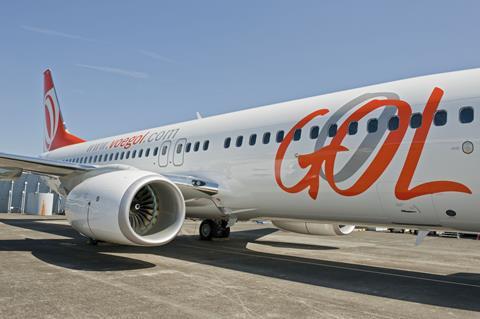Restructuring Brazilian low-cost carrier Gol swung to a net loss of R1.1 billion ($221 million) in the fourth quarter, the first results it has disclosed since entering bankruptcy protection in January.
The loss compared to a net profit of R231 million for the same period in 2022 and reflects the R1.1 billion impact of foreign exchange losses and other one-off items during the fourth quarter.
By contrast, Gol reported a near-doubling of profits at an operating level, posting earnings before interest and tax (EBIT) for the last three months of 2023 of almost R1.2 billion.
Gol boosted revenues almost 7% to R5 billion ($1 billion) in the fourth quarter, on passenger levels broadly flat at 7.8 million. Load factor climbed almost four points to 84%.
The revenue performance was set against a 6% cut in operating costs during the quarter to R3.86 billion.

Full-year revenues climbed 12% over 2022 to reach R17 billion, in carrying 30 million passengers during 2023.
Gol will not hold an earnings call to expand upon the results. The carrier in January filed for bankruptcy protection in a US court and is working its way through a restructuring. In its quarterly earnings report, it reveals no new information regarding the process.
“The company remained focused on operational efficiency through an optimised fleet and yield management, in addition to being dedicated to the continuous delivery of excellence in the products offered to customers,” Gol says.
At the end of the fourth quarter, Gol had 141 aircraft in its all-Boeing 737 fleet, of which 91 were older-generation NGs, 44 were Max variants, and six were Cargo NGs. It still has 101 orders for further Max aircraft, including for 64 examples of the Max 8 and 37 for the as yet-uncertificated Max 10 model.
The US court handling Gol’s bankruptcy filing has since granted the carrier’s request to access up to $1 billion of debtor financing. Gol says this will be used for, ”among other things, designated working capital expenditures, general corporate needs, and restructuring-related costs”.
It has planned for all passenger service, Gollog cargo flights, its loyalty programme and other operations to continue during the restructuring process.
Gol is the fourth Latin American carrier to file for bankruptcy in the wake of the disruptive Covid-19 crisis. In 2020, Aeromexico, Avianca and LATAM Airlines all used the Chapter 11 process to restructure their finances.
Gol joined with Colombia’s Avianca in May 2022 in forming the holding group Abra, which was touted as an opportunity for the airlines to better compete in international long-haul and cargo markets and to launch new flights. Under the agreement, both carriers maintain their individual brands, strategies and teams – a move intended to create long-term stability in the post-coronavirus environment.
The structure is controlled by the principal shareholders of Avianca and the majority shareholder of Gol, and led by Latin American airline veterans. Adrian Neuhauser, formerly chief executive of Avianca, ascended to the Abra CEO position at the beginning of 2024.


























